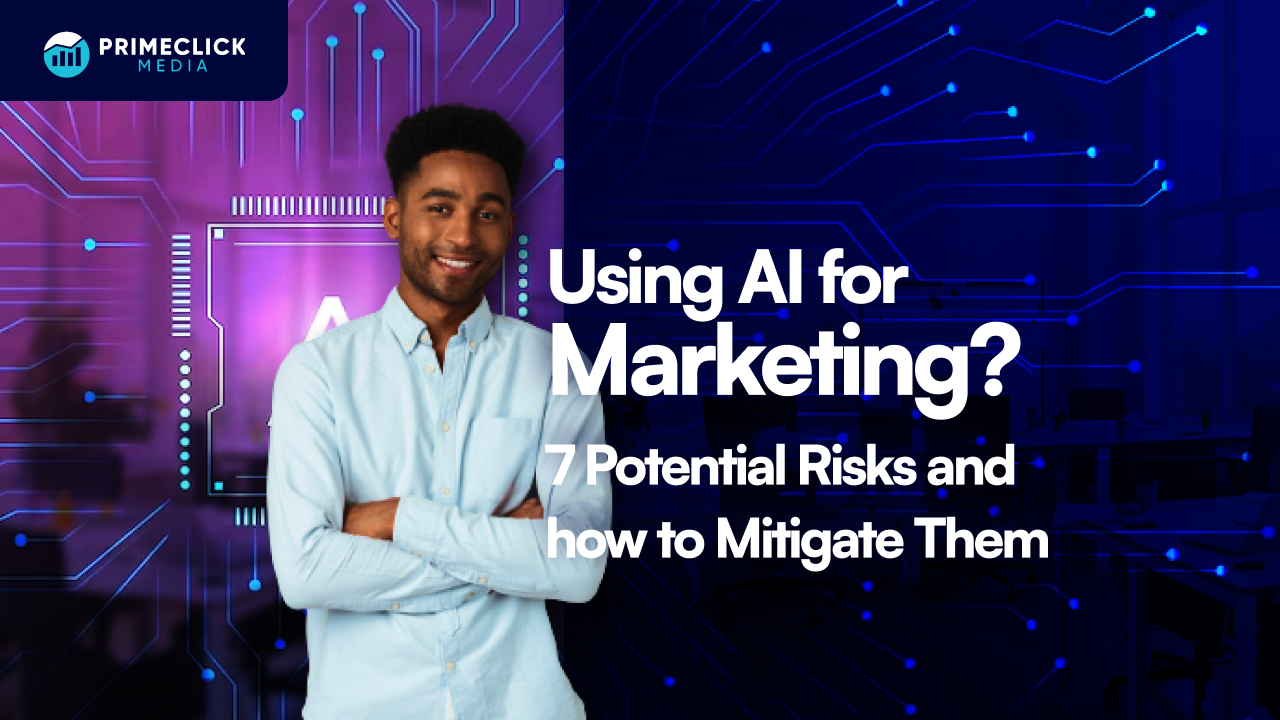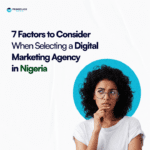
As industries are being reshaped by technological advancements, the use of Artificial Intelligence (AI) in marketing strategies is growing rapidly. Marketers, content creators, top brands, and SMEs are all taking advantage of AI’s abilities to personalize, improve efficiency, and foster innovation. Nevertheless, it is important to recognize its flaws and examine ways to manoeuvre them.
In this article, we will delve deep into seven potential risks that come with AI-powered marketing initiatives. By understanding these risks and arming ourselves with effective mitigation strategies, we can navigate this transformative landscape while steering clear of pitfalls that could hinder our marketing success.
7 potential risks that come with AI-powered marketing initiatives
Risk 1: Data Privacy and Security
While AI offers significant benefits, it also poses certain risks, particularly regarding data privacy and security. Businesses must exercise caution in handling, storing, and safeguarding customer information as AI algorithms heavily depend on extensive datasets for precise predictions and decisions. Unauthorized access, data breaches, and cyberattacks can lead to severe consequences such as financial losses, reputational harm, and potential legal implications.
Strategies to Mitigate Data Privacy and Security Risks
- Collect only the data necessary for AI-driven marketing activities. Don’t feed them any data that you wouldn’t make public.
- Delete or anonymize data that is no longer needed for analysis.
- Train employees on data security best practices and the importance of safeguarding customer data.
Risk 2: Bias and Discrimination
While Artificial Intelligence holds great promise for enhancing marketing strategies, it also has the potential to perpetuate bias and inequality in decision-making processes. AI systems learn from historical data, which can contain biases present in society. If the training data is skewed or reflects existing prejudices, the AI algorithms may inadvertently amplify these biases when making marketing decisions. Bias in AI algorithms can lead to unfair treatment of certain demographic groups and compromise the integrity of marketing efforts.
Strategies to Mitigate AI Bias and Discrimination
- Regularly evaluate AI algorithms for potential bias using techniques like demographic parity or equal opportunity measures.
- Choose AI models that provide explanations for their decisions (interpretable AI) to understand how certain choices are made.
- Incorporate human reviewers who are trained to identify and address biased outcomes in AI-generated content.
Risk 3: Lack of Search Engine Optimisation (SEO)
When using AI for digital marketing content, there is a risk of overlooking or neglecting proper SEO practices. SEO is crucial for improving a website’s visibility and ranking on search engine results pages. If the AI is not programmed or trained to prioritize SEO, it can lead to reduced organic traffic and hinder the overall effectiveness of your digital marketing efforts.
Strategies to Mitigate this Risk
- While AI can automate many aspects of content generation in digital marketing, it is crucial to have human oversight and intervention.
- Experienced SEO professionals should provide valuable insights, review AI-generated content, and make necessary adjustments to ensure optimal SEO performance.
- Leverage the capabilities of effective SEO tools such as QuillBot to thoroughly assess your content for grammar accuracy, spelling precision, and a variety of other essential factors that contribute to its overall SEO quality and online visibility.
Risk 4: Incorrect Information
Even though AI systems are meant to learn and get better over time, they can sometimes mess up and give wrong or confusing info.
As digital marketers, our job is to share accurate reliable information. If we share things that aren’t true, it can make customers not trust us and hurt our brand’s reputation. That’s why it’s very important to make sure the information we put out there is accurate and reliable. This way, we can keep our connection with our audience strong and trustworthy. on.
Strategies to Mitigate the Risk of Incorrect Information
- Introducing a manual review process to verify and validate AI-generated content before it’s published.
- Cross-referencing AI-generated insights with verified data sources to confirm their accuracy.
- Employing skilled professionals to fact-check and ensure the accuracy of information.
Risk 5: Over-reliance on Artificial Intelligence
AI tools are widely recognized for their exceptional power, user-friendliness, and speed. Moreover, they offer significant resource savings in terms of both time and materials. However, this heavy dependence on AI technology may not prove advantageous for marketers or business owners in the long run. It can potentially hinder collaboration, creativity within teams and likely diminish their competence in the future.
Strategies to Mitigate the Risk of Over-reliance on AI
- Humans should still play major roles in creating compelling content, engaging with customers, and providing a personalized touch.
- Prioritize ethical considerations and transparency in AI applications. Clearly communicate to customers when AI is being utilized and how it impacts their experience.
- Develop contingency plans for scenarios where AI might fail or produce suboptimal results. This ensures you have alternatives in place when needed.
Risk 6: Marketing Content Looks Homogeneous and Robotic
When comparing marketing content created by AI with content written by human marketers, it becomes apparent that certain phrases or sentences may sound mechanical or peculiar. Additionally, a portion of the AI-generated content is recycled, resulting in a sense of monotony and repetition when the same prompts are used repeatedly. It becomes akin to encountering the identical message conveyed in a nearly identical manner, time and time again.
Strategies to Mitigate this Risk
- As a human, do a major part of the work. Be involved in creating the content, engaging with customers, and providing a personalized touch.
- Leverage data-driven insights to deliver content that feels tailored to each individual. With the added benefit of human creativity and personalization, the resulting content will resonate more profoundly with audiences.
- Train AI models on a diverse range of writing styles, tones, and voices to ensure content is dynamic and engaging.
Risk 7: Lack of Personalization
Personalization is essential in today’s digital marketing strategies as customers demand customized experiences that meet their specific needs and preferences. However, AI-powered digital marketing campaigns may not always meet this expectation, resulting in generic and impersonal marketing content. This lack of personalization can lead to decreased customer engagement, lower conversion rates, and ultimately, a negative impact on the overall success of marketing campaigns.
Strategies to Mitigate this Risk.
- Combine AI-generated content with human-curated elements, striking a balance that offers both efficiency and personalized creativity.
- Segment their audience/customer base into groups based on shared characteristics.
- From there, they can deliver more personalized content and offers to each segment, enhancing customer engagement.
Conclusion
While AI brings automation and efficiency to the forefront, but the human touch remains an irreplaceable facet of successful marketing. There is a need to strike a balance between innovation and authenticity.
At Primeclick Media, we recognize the significance of customer-centric campaigns designed to meet their specific requirements. Our team crafts campaigns and landing pages that prioritize the human element, ensuring a personalized and relatable experience for our valued clients.




